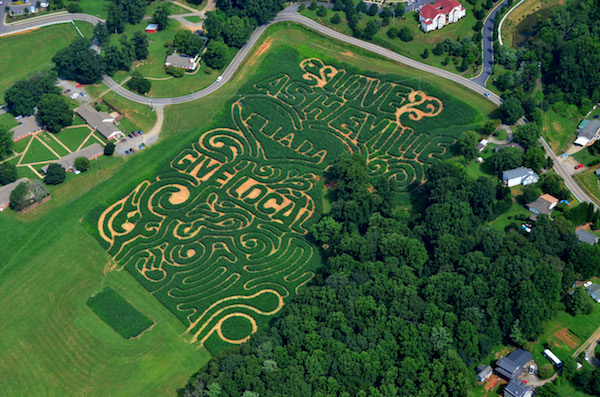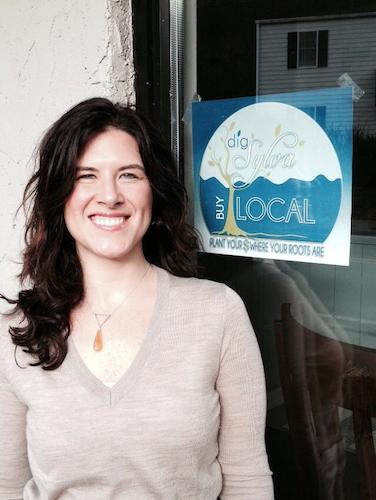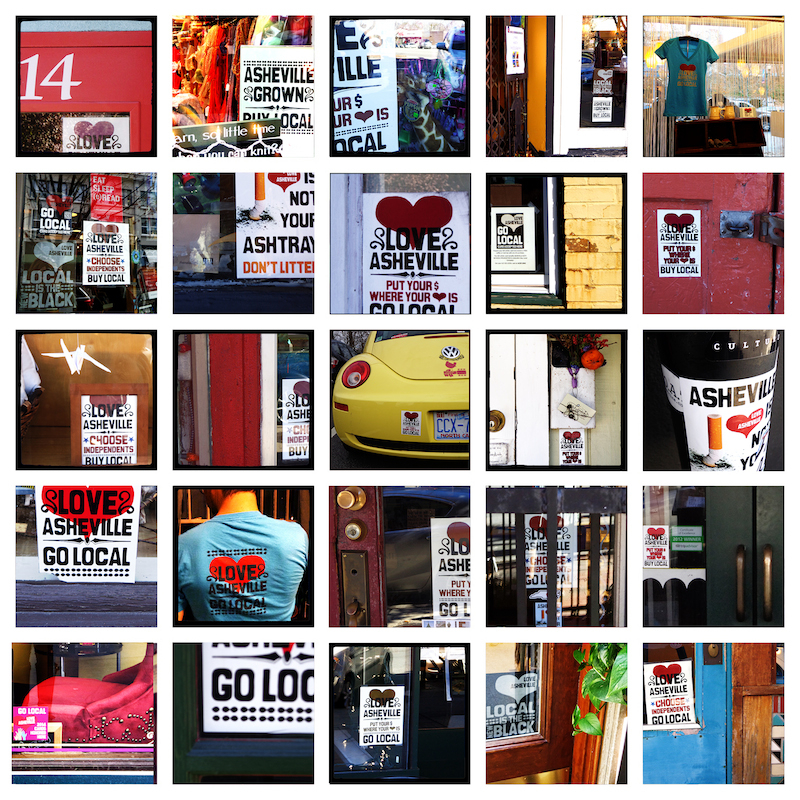It’s time to kick off the third year of Go Local, the loyalty card from Asheville Grown Business Alliance that raises money for Asheville City Schools by supporting the local economy. Part two of our series looks at how the movement to buy local is growing throughout Asheville and western North Carolina.
It started as little more than a poster in a window — a heart and the words “Love Asheville, Go Local” — a symbol the observant eye has undoubtedly come to know well. You’ll find it in shop windows, on the bumpers of cars, on the backs of T-shirts. That symbol launched the Asheville Grown Business Alliance, now an organization of hundreds of locally owned independent businesses, that encourages residents and visitors to support the local economy and local schools through the Go Local loyalty card.
Asheville Grown Director Franzi Charen, who first created that poster for her shop Hip Replacements, said this year will also be the first year the alliance will receive a portion of the sales from the card. That means new developments are in the works, including making the “Love Asheville” symbol more visible than ever.
“We’ve wanted to create a ‘Love Asheville, Go Local’ mural forever,” said Charen. “It would really beautify downtown, and I believe we can make that happen this year.”
Alsace Walentine, events coordinator at Malaprop’s Bookstore, said her store has participated in the Go Local card for all three years and will be expanding its Go Local discount offerings for 2014.
“We are heavily invested in the Go Local Card,” said Walentine. “And we’re seeing the returns — we’re hearing a lot more conversation from our customers, telling us they will only shop locally.” — C.E.

‘Go Local’ grows local
This year, “Go Local” inspired new meaning when Eliada Homes, a nonprofit serving the children and families of Western North Carolina, decided to grow local for its fifth annual corn maze.
The maze featured the familiar Asheville Grown Business Alliance “Love Asheville, Go Local” design with a twist, cut by professional maze-cutter Shawn Stolworthy and Maze Play from Firth, Idaho. Stolworthy designs mazes from photographs on his iPad, plugs the designs into his GPS and travels the country, plowing prosperous fields into locally inspired labyrinthine layouts.
And that’s exactly how the phrase “Love Asheville, Give Local” became ingrained into the fields for the fall season, the message serving as a tribute to Eliada’s role in Asheville and the surrounding community.
“[The design] was the decision of our development team at Eliada,” says Special Events Coordinator Alisa Brown. “We decided there was no better way to incorporate the corn maze into our community than to partner up with the Asheville Grown Business Alliance.
“I think it was a big success,” she continues. “It certainly helped get Eliada recognized, and I think it helped the business alliance as well. We got a lot of positive response from the maze design. Not only was it pretty neat looking, but Asheville is such a local-centric community. It fit right in.”
Though the maze is no longer up due to the change in season, ticket sales for the maze, which operated every weekend from Sept. 6 to Oct. 27, raised more than $160,000 for the nonprofit and brought an estimated 20,000 visitors to Eliada’s property, up from $120,000 last year.
“That was our biggest year yet,” Brown says. “One hundred percent of the proceeds benefit the children and families served by Eliada. We’re over 100 years old, and for the first 80 years of that, we were an orphanage. Today Eliada serves children and families — from infants through about 20-21 years old, offering a wide spectrum of help: from needs on campus to psychiatric residential help, and from foster care and therapeutic foster care to a school to meet the special needs of kids.
“I realize that’s pretty overwhelming,” Brown says, laughing, about the organization’s long list of local aid, but she explains all of the proceeds from the corn maze go to the nonprofit’s plethora of projects and programs dedicated to bettering the lives of Western North Carolinians.
Some of the programs that benefit from the annual corn maze are therapeutic programs for children and young adults who need alternative ways of dealing with aggression, goal-setting, stress and their emotions, such as animal therapy at the campus’ barn and a program called National Youth Project Using Mini-Bikes, or NYPUM.
Both Eliada’s barn full of animals and its mini-bike program have been featured in past years’ maze designs, but Brown says the organization’s development team felt this year’s slightly altered AGBA slogan to “Give Local” would help remind area residents to give back to their communities in a fun and enjoyable way. — H.B.

Love Asheville? Love WNC.
Of course, the move to support local economies isn’t specific to Asheville. National movements like Small Business Saturday have sent millions of shoppers into their local business, including President Obama and his daughters.
As the local movement is growing throughout the country, it’s spreading throughout Western North Carolina. The founders of two organizations — one in High Country and one in Sylva — were both mentored by Charen and Asheville Grown before beginning similar programs in their own communities.
“I took that conversation with Franzi and started brainstorming, building my passion,” says Sandra Dennison who founded Sylva’s “Dig Local” campaign.
The inspiration for the campaign, with a logo that incorporates elements of nature and the motto “Plant your money where your roots are,” came from Sylva’s rich agriculture community, she explains.
“I started thinking about what’s the difference between Sylva and Asheville, or Sylva and other communities,” says Dennison. “I thought about our community gardens, our local farmers, our farmers market.”
The Sylva campaign is “at the very beginning,” appearing now as T-shirts and posters in sign windows, much like the early stages of the “Love Asheville — Go Local” campaign. Dennison says the movement is being backed by downtown merchants and regional newspapers in the hope that it will grow into a loyalty card similar to Go Local, as well as a means to fund festivals and other events in Sylva’s downtown.
“There’s definitely an interest, but it can be a bit tough because we are such a small community,” Dennison says. “It’s going to take a few key people, a lot of passion and really generating interest.”
Another program that mentored under Asheville Grown, High Country Local First, is in its third year of organizing locally owned businesses in Boone and surrounding areas. Started by Mary Scott, the group has now been offering a rewards card for two years, but unlike the Asheville model, the profits of this reward card are split among several ventures.
“We have a lot going on in Boone and in High Country in general,” says Membership Director Chris Grasinger. “There’s a lot of energy and interest being generated around local food development, so we wanted to support that, as well as our local schools. And there’s also a great deal of entrepreneurial energy, and we felt we needed to support that in whatever way we can.”
About 50 businesses are currently participating in the High Country card campaign, which generates funds for PTO organizations, an entrepreneurial fund, and, for the first time this year, a Farm to School grant, which supports local food initiatives in public schools. — C.E.




Before you comment
The comments section is here to provide a platform for civil dialogue on the issues we face together as a local community. Xpress is committed to offering this platform for all voices, but when the tone of the discussion gets nasty or strays off topic, we believe many people choose not to participate. Xpress editors are determined to moderate comments to ensure a constructive interchange is maintained. All comments judged not to be in keeping with the spirit of civil discourse will be removed and repeat violators will be banned. See here for our terms of service. Thank you for being part of this effort to promote respectful discussion.